新概念英语第二册第92课课件
合集下载
经典人类史上最最最最最经典的新概念二课件,新二,新概念第二册课件 (92)
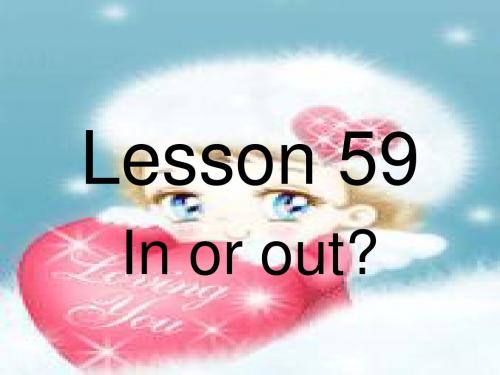
4. spend… in doing sth. 5. let sb in/ out 让某人进来/出去 6. develop bad habit 养成坏习惯 7. shut v. 关,关上 shut one’s eye 闭上眼睛 shut the door on sth. 拒不考虑某事 物
• This is a photo. Two school girls and two women are in it. The girl in a white skirt is Han Mei. Look! She is tall with big eyes, black hair , a round face and she looks very nice. The woman with brown hair is my mother .She is our English teacher. The woman with big eyes is
• Han Mei’s mother. She is our Chinese teacher. Do you know the girl in red ? It is me. Han Mei and I are in the same class. We are good friends . We are both thirteen. We go to school together every day.
latch
n. 插销 v. 插上插销 on the latch 关着门
latch
expert
expert n. 专家 adj. 内行的 凯特是个幼儿教育专家 Kate is an expert in teaching small children. **be expert in/at/on… 在…是专家
新概念英语第二册 第92课 Asking for trouble 自找麻烦

Will you stay outside and cry?
Will you ask for help?
出门忘记带钥匙 消防官兵紧急施救
Did you try to climb up like this old lady?
六旬老太忘记带钥匙徒手爬楼 被卡四楼外墙
Watch a short movie and answer the questions:
Notes on the text 1.ask for trouble 自找麻烦,自讨苦吃(多 用于口语)。
You shouldn„t have been so rude to her. You are asking for trouble. 你不该对她那么粗鲁。你这是自找麻烦。
The boss seems Байду номын сангаасo be annoyed. To talk to him now is to ask for trouble. 老板似乎在生气。现在找他谈话是自讨苦吃。
4. I looked down and nearly fell off the ladder ...
fall off掉下 At the very beginning of learning bicycle, I often fell off . 一开始学骑车时,我总摔下来。
5.I immediately regretted answering in the way I did. 我立刻后悔不该那样回答。 regret 后面接动名词形式与接不定式的含义不同。 接动名词形式表示对做过的事感到后悔,接不定 式则表示对现在将发生的事感到遗憾或抱歉.
7.I hate to interrupt a man when he's busy working, but would you mind coming with me to the station?‟ (1)be busy doing sth. 忙着做某事 I am busy doing my homework . 我正忙着做家庭作业。 (2)would you mind doing sth 你介意做... Would you mind my closing the window? 你介意我 关上窗户吗?
新概念英语NCE2_Lesson92(共24页)课件
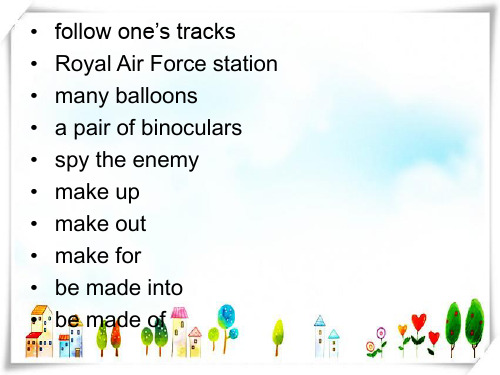
'So do I,' answered the policeman in the same tone. “我也是的,”警察用同样的声调回答, “
'Excuse my interrupting you. I hate to interrupt a man when he'u mind coming with me to the station?' 请原谅我打断了您。当一个人在忙 着干活时,我是不愿意去打断他的, 但请您跟我到警察局去一趟好吗?”
• inform sb of sth • seem to do sth • explain sth • must be • can’t be
I could not make him out what he said. He seems to be making a call. The whole story is made up.
• ★ It must have been about two in the morning when I returned home.
• 我回到家时,肯定已是凌晨两点左 右了。
• ※ must have done 对发生完得事的 一种比较肯定的判断
★ I tried to wake up my wife by ringing the doorbell,
Asking for trouble 自找麻烦
• ★ make trouble • 闹事, 捣乱、惹麻烦 • take the trouble to do sth • 费力做某事,不辞劳苦做某事 • get into trouble • 陷入困境, 惹上麻烦 • have trouble in doing sth
'Excuse my interrupting you. I hate to interrupt a man when he'u mind coming with me to the station?' 请原谅我打断了您。当一个人在忙 着干活时,我是不愿意去打断他的, 但请您跟我到警察局去一趟好吗?”
• inform sb of sth • seem to do sth • explain sth • must be • can’t be
I could not make him out what he said. He seems to be making a call. The whole story is made up.
• ★ It must have been about two in the morning when I returned home.
• 我回到家时,肯定已是凌晨两点左 右了。
• ※ must have done 对发生完得事的 一种比较肯定的判断
★ I tried to wake up my wife by ringing the doorbell,
Asking for trouble 自找麻烦
• ★ make trouble • 闹事, 捣乱、惹麻烦 • take the trouble to do sth • 费力做某事,不辞劳苦做某事 • get into trouble • 陷入困境, 惹上麻烦 • have trouble in doing sth
新概念第二册-92课
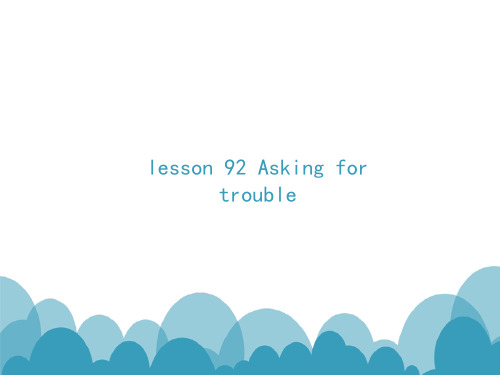
• • • • • • • •
need doing sth = need to be done 需要做某事,需要被…… 教室需要打掃. The classroom needs cleaning . 這件襯衫需要熨燙. The shirt needs ironing . The windows need cleaning. 这些窗子该擦了。(=need to be cleaned)
• enjoy doing sth 喜歡做某事 • I enjoy sitting in a boat and doing nothing at all . • 我喜歡坐在船上,做麼也不做。 • 今年澳大利亚的护士平均享受40天的带薪假期。 • The average Austrilian nurses will enjoy 40 days' paid holiday this year. • I enjoy the mental stimulation of a challenging job. • 我喜欢富有挑战性的工作所带来的强烈的精神刺 激。
.sarcastic
• • • • •
讽刺的,嘲笑的,挖苦的 I'm sick of your sarcastic remarks. 我已经听腻了你的冷嘲热讽 She talked with him with sarcastic tones. 她用挖苦的语调和他说话
tone (1)语气,口气,腔调:
• must+have+过去分词表示对过去发生的事进行推 测(其否定式为can't+have+过去分词,cf.第17 课语法);need+have+过去分词表示过去不必做 但实际已做了的事(cf.第41 课语法); should/ought to+have+过去分词表示本来应该做 而实际未做的事(cf.第65 课语法): • He had found five empty whisky bottles which the ghost must have drunk the night before. • 他发现了5 只空的威士忌酒瓶子,这肯定是鬼魂 前天晚上喝的。
新概念英语第二册第92课PPT课件
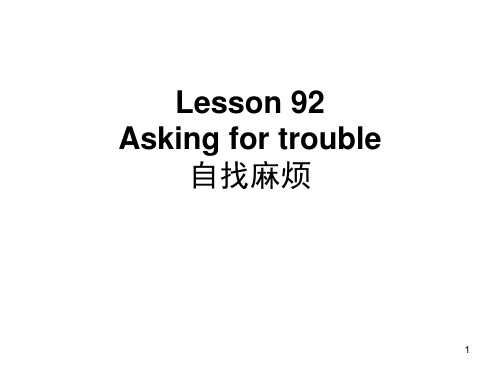
• The policeman answered in a sarcastic tone.
• 警察用讽刺的口吻回答。
• The waiter greeted us in a friendly tone. • 那侍者用友好的口气同我们打招呼。 • (2)语调,声调:
• You should use the rising / falling tone at the end of this sentence.
• She's going to help us and so is Jim.
• 她将帮助我们,吉姆也将帮助我们。(重
复助动词is)
12
• He likes his beer and so does Frank. • 他喜欢啤酒,弗兰克也喜欢。(加助动词
a paper. • 去车站的路上,我停下来买了一张报纸。 • stop+ 动名词形式表示停下正在做的动作: • When he told us the story, we just couldn't
stop laughing. • 他给我们讲故事时我们不禁都笑个不停。
8
• 1.tone n. • (1)语气,口气,腔调:
• 在这句话的结尾你应该用升调/降调。 9
• 3)格调,风格,气氛: • Her dress has a bright tone. • 她的衣服格调明快。 • The building has a foreign tone. • 这座建筑物有一种异国情调。
10
• 2.用于并列补充句和反应句的 so与 neither/nor
• I remember posting / having posted the letters. • 我记得已把信寄了。 • Have you forgotten meeting / having met her
• 警察用讽刺的口吻回答。
• The waiter greeted us in a friendly tone. • 那侍者用友好的口气同我们打招呼。 • (2)语调,声调:
• You should use the rising / falling tone at the end of this sentence.
• She's going to help us and so is Jim.
• 她将帮助我们,吉姆也将帮助我们。(重
复助动词is)
12
• He likes his beer and so does Frank. • 他喜欢啤酒,弗兰克也喜欢。(加助动词
a paper. • 去车站的路上,我停下来买了一张报纸。 • stop+ 动名词形式表示停下正在做的动作: • When he told us the story, we just couldn't
stop laughing. • 他给我们讲故事时我们不禁都笑个不停。
8
• 1.tone n. • (1)语气,口气,腔调:
• 在这句话的结尾你应该用升调/降调。 9
• 3)格调,风格,气氛: • Her dress has a bright tone. • 她的衣服格调明快。 • The building has a foreign tone. • 这座建筑物有一种异国情调。
10
• 2.用于并列补充句和反应句的 so与 neither/nor
• I remember posting / having posted the letters. • 我记得已把信寄了。 • Have you forgotten meeting / having met her
新概念第二册-Lesson 92 Asking for trouble
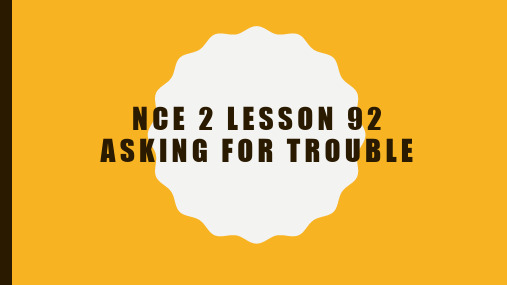
“我也是的,”警察用同样的声调回答,“请原谅我打断了您。当一个人 在忙着干活时,我是不愿意去打断他的,但请您跟我到警察局去一趟好吗?”
“可我更愿意呆在这儿,”我说,“您瞧,我忘带钥匙了。”
“什么?”他大声问。 “钥匙!”我喊道。 幸运得很,这喊声惊醒了我的妻子。就在警察开始向我爬上来时,她打开 了窗子。
LADDER
ladder /ˈlædə(r)/ n. 梯子 E.g. She needs to step on ladder to put on the curtain. 她需要踩上梯子才能挂上窗帘。
SHED
shed /[ʃed/ n. 棚子 v. 使落下 UK(英国) a garden/bicycle shed 花园/自行车棚 E.g. This is a tool/storage shed. 这是一间工具/储物棚。 E.g. The dog shed. 狗掉毛。 E.g. The trees shed their leaves in autumn. 树木在秋天落叶。 -Cambridge Dictionary
NCE 2 LESSON 92 ASKING FOR TROUBLE
NEW WORDS AND EXPRESSION
fast /fɑːst/ adv. 熟(睡) ladder /ˈlædə(r)/ n. 梯子 shed /[ʃed/ n. 棚子
sarcastic /sarcastic/ adj. 讽刺的,讥笑的 tone /tone/ n. 语气,腔调
It must have been about two in the morning when I returned
TEXT
home. I tried to wake up my wife by ringing the doorbell, but
“可我更愿意呆在这儿,”我说,“您瞧,我忘带钥匙了。”
“什么?”他大声问。 “钥匙!”我喊道。 幸运得很,这喊声惊醒了我的妻子。就在警察开始向我爬上来时,她打开 了窗子。
LADDER
ladder /ˈlædə(r)/ n. 梯子 E.g. She needs to step on ladder to put on the curtain. 她需要踩上梯子才能挂上窗帘。
SHED
shed /[ʃed/ n. 棚子 v. 使落下 UK(英国) a garden/bicycle shed 花园/自行车棚 E.g. This is a tool/storage shed. 这是一间工具/储物棚。 E.g. The dog shed. 狗掉毛。 E.g. The trees shed their leaves in autumn. 树木在秋天落叶。 -Cambridge Dictionary
NCE 2 LESSON 92 ASKING FOR TROUBLE
NEW WORDS AND EXPRESSION
fast /fɑːst/ adv. 熟(睡) ladder /ˈlædə(r)/ n. 梯子 shed /[ʃed/ n. 棚子
sarcastic /sarcastic/ adj. 讽刺的,讥笑的 tone /tone/ n. 语气,腔调
It must have been about two in the morning when I returned
TEXT
home. I tried to wake up my wife by ringing the doorbell, but
新概念第二册-92课
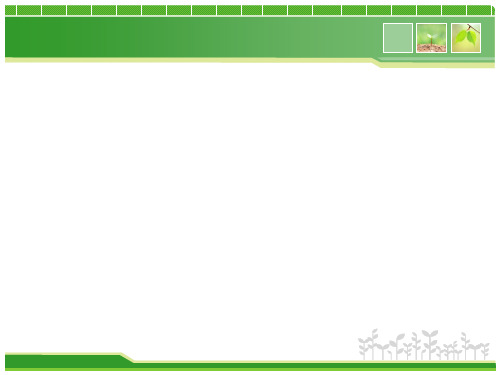
• must+have+过去分词表示对过去发生的事进行推 测(其否定式为can't+have+过去分词,cf.第17 课语法);need+have+过去分词表示过去不必做 但实际已做了的事(cf.第41 课语法); should/ought to+have+过去分词表示本来应该做 而实际未做的事(cf.第65 课语法):
• 主考人对我的表现想必是满意的。 • You needn't have said that. • 你没必要这么说。(实际已经说了) • You needn't have told him about my plans. • 你本不必把我的打算告诉他。(实际上已告诉了
他)
• He should have gone along a side street. • 他应该走一条小街。(实际上他走了主要街道)
• At last they woke up to the seriousness of the situation .
• 他们终于觉悟到事态的严重性。
bedroom 卧室
sitting room 客厅 ,起居室
living room bath room 卫生间
• need doing sth = need to be done • 需要做某事,需要被…… • 教室需要打掃. • The classroom needs cleaning . • 這件襯衫需要熨燙. • The shirt needs ironing . • The windows need cleaning. • 这些窗子该擦了。(=need to be cleaned)
• He had found five empty whisky bottles which
新概念英语第二册第92课
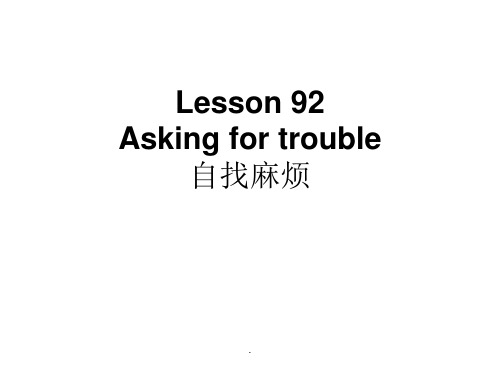
.
• remember / forget+ 动名词形式则指过去的动 作(已发生过):
• I remember posting / having posted the letters. • 我记得已把信寄了。 • Have you forgotten meeting / having met her
.
• 2.用于并列补充句和反应句的 so与 neither/nor
• so和 neither/nor 用于并列补充句和表示 反应的句子时表示“也”、“同样”, so 用
• 于肯定句,neither /nor 用于否定句 (neither 和 nor完全可以互换)。它们后 面跟的是省略
• 形式的分句,只有助动词+ 主语,也可以是 情态助动词 +主语: .
又如:
• I don't believe he is still in London. • 我相信他已不在伦敦。.
• (2)need cleaning 的含义相当于 • need to be cleaned。
• need 表示“需要”时,后面接的动名词有 被动的含义
• The strap needs mending. • 这提包带需要修理。
at a party? • 你忘记了曾在一次聚会上见过她吗?
.
• stop+ 不定式指目的: • On the way to the station I stopped to buy
a paper. • 去车站的路上,我停下来买了一张报纸。 • stop+ 动名词形式表示停下正在做的动作: • When he told us the story, we just couldn't
• remember / forget+ 动名词形式则指过去的动 作(已发生过):
• I remember posting / having posted the letters. • 我记得已把信寄了。 • Have you forgotten meeting / having met her
.
• 2.用于并列补充句和反应句的 so与 neither/nor
• so和 neither/nor 用于并列补充句和表示 反应的句子时表示“也”、“同样”, so 用
• 于肯定句,neither /nor 用于否定句 (neither 和 nor完全可以互换)。它们后 面跟的是省略
• 形式的分句,只有助动词+ 主语,也可以是 情态助动词 +主语: .
又如:
• I don't believe he is still in London. • 我相信他已不在伦敦。.
• (2)need cleaning 的含义相当于 • need to be cleaned。
• need 表示“需要”时,后面接的动名词有 被动的含义
• The strap needs mending. • 这提包带需要修理。
at a party? • 你忘记了曾在一次聚会上见过她吗?
.
• stop+ 不定式指目的: • On the way to the station I stopped to buy
a paper. • 去车站的路上,我停下来买了一张报纸。 • stop+ 动名词形式表示停下正在做的动作: • When he told us the story, we just couldn't
新概念英语NCE2_Lesson92(共20页)课件

•
----- So can Tom.
• 2. ----- They like eating apples.
•
----- So do I.
• 3. ----- Li Ming is a good student.
----- So is Mary
二、Neither/ nor 引导的倒装句(否定)
Neither/ nor + 功能词 + 主语,该句型必须具 备两个条件:a,上句为否定句;b,该主语与上 句主语不一致。
• 4 作定语 • A swimming pool
• Need need doing 表被动意义,主语需要被…… • 花需要被浇水了。 • The flower needs watering. • 她的房间需要打扫。 • Her room needs cleaning • need to do 表主动意义,主语需要做…… , • 她需要做作业。 • She needs to do her homework. • 我们需要告诉他真相。 • We need to tell him the truth.
• I like fast music.
• Ladder n 梯子 • 把梯子倚在树上 • Put up the ladder against a tree • 爬上梯子 • put up the ladder • 爬下梯子 • Put down the ladder 成功的阶梯
the ladder to / of success
be/get used to
look forward to
get down to
pay attention to
devote oneself to
新概念英语第二册Lesson92(共24页)

knock down the ladder = knock away the ladder 过河拆桥
sarcastic
I squashed him with a sarcastic remark. 我说了一句讽刺的话把他给镇住了。 squash[skwɒʃ]vt. 镇压;把…压扁;使沉默
She poked fun at people's shortcomings with sarcastic remarks. 她冷嘲热讽地拿别人的缺点开玩笑。 poke fun at取笑,嘲弄
★ fast (1) adv. 熟(睡)(soundly) eg:He is fast asleep . = He is sleeping soundly . = He is sleeping deeply . 他睡得很熟.
★ ladder (1) n. 梯子 climb up a ladder 爬上梯子 → climb down a ladder 爬下梯子 (2) (发迹、成功于)阶段、手段 the ladder to success = the ladder of success 成功的阶梯
• • • • • • • • • •
follow one’s tracks Royal Air Force station many balloons a pair of binoculars spy the enemy make up make out make for be made into be made of
• • • • •
inform sb of sth seem to do sth explain sth must be can’t be
I could not make him out what he said. He seems to be making a call. The whole story is made up.
新概念二第92 课 课件(35张PPT)
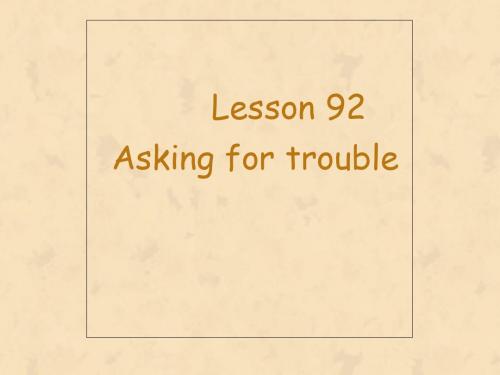
• a high [low] tone • (3) 色调 • 群山呈现出各种色调的绿色。 • The mountains are in several tones of green .
Listen
• 1.What happened when the writer returned home?
• 2.What did he answer when he see the police?
I enjoy sitting in a boat and doing nothing at all .
6. 'So do I,' answered the policeman in the same tone. 'Excuse my interrupting you.
“我也是的,”警察用同样的声调回答,“请原谅我打断了您。
regret doing sth 后悔做过某事 regret to do sth 遗憾(要)做某事
I regret being unable to help you. 很抱歉的告诉你,史密斯先生卧病在床。
I regret to say that Mr. Smith is ill in bed. enjoy doing sth 喜欢做某事 我喜欢坐在船上,什么也不做。
• 与 irony 相比,sarcasm 通常含有欲伤及对方 的意思。
★ tone • (1) n. 语气,腔调 • 她用低沉的口去气说话。
• She spoke in a low tone . • 她用恼怒的口气说话。
• She spoke in an angry tone . • (2) 音色、音调 • 高[低]调
★ shed • (1)n. 棚子、小屋、存放地 • 牛棚
Listen
• 1.What happened when the writer returned home?
• 2.What did he answer when he see the police?
I enjoy sitting in a boat and doing nothing at all .
6. 'So do I,' answered the policeman in the same tone. 'Excuse my interrupting you.
“我也是的,”警察用同样的声调回答,“请原谅我打断了您。
regret doing sth 后悔做过某事 regret to do sth 遗憾(要)做某事
I regret being unable to help you. 很抱歉的告诉你,史密斯先生卧病在床。
I regret to say that Mr. Smith is ill in bed. enjoy doing sth 喜欢做某事 我喜欢坐在船上,什么也不做。
• 与 irony 相比,sarcasm 通常含有欲伤及对方 的意思。
★ tone • (1) n. 语气,腔调 • 她用低沉的口去气说话。
• She spoke in a low tone . • 她用恼怒的口气说话。
• She spoke in an angry tone . • (2) 音色、音调 • 高[低]调
★ shed • (1)n. 棚子、小屋、存放地 • 牛棚
新概念英语第二册Lesson 92 (共80张PPT)
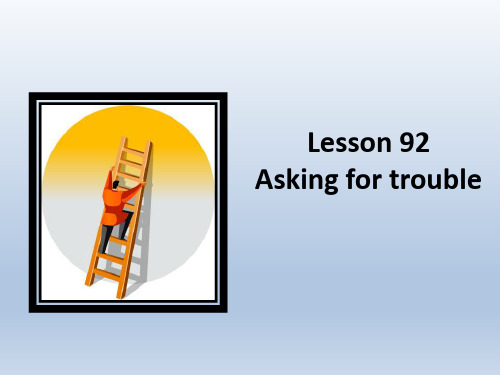
Grammar 动名词
I remember to have breakfast. 我记得要吃早饭。
Grammar 动名词
I remember having breakfast. 我记得我吃了早饭。
Grammar 动名词与不定式作宾语
有些动词接动名词与不定式作宾语,意 思相近,如begin, start, continue.
外研社版初二下P150
Grammar 动名词
我听见她唱歌。 I hear her sing. I hear her singing.
Grammar
I see it burn. I see it burning.
PATTERN DRILL
Pattern Drill
1
T:eating between meals S1:Eating between meals is bad for you. S2:But I LIKE eating between meals!
New words and expressions
tone n.
in a friendly tone in a low tone in a sarcastic tone
New words and expressions
tone n.
Don’t take that tone with me.
take that tone with sb. 对某人说话拿腔拿调
New words and expressions
tone n.
‘You must be Annie’, he said in a friendly tone.
New words and expressions
tone n.
教学新概念第二册-92-Asking-for-trouble

词汇辨析
• • • • • • • • • end/ finish/ stop end 指动作过程终止。 finish 指动作已完成,再没有动作可做。 stop 侧重动作的停止,即由“动”到“不动”。如: Everything ended. 一切都结束了。 Have you finished your work? 你的工作做完了吗? He stopped reading to have a rest. 他停止阅读,休息了一会儿。
LESSON 87
• • • • • • • 1 alibi ['æ libai] n.不在犯罪现场 2 commit [kə'mit] v.犯(罪、错) 3 inspector [in'spektə] n.探长 4 employer [im'plɔiə] n.雇主 5 confirm [kən'fə:m] v.确认,证实 6 suggest [sə'dʒest] v.提醒 7 truth [tru:θ] n.真相
词汇辨析
• enter/ enter into • Ⅰ.enter. “进入”表进入一个具体处所,如房间、场所等,后面无需 加介词; 也可表“进入”某个时期或阶段;当表示加入某个组织而成 为其成员时, enter相当于join.如: • ① She entered the house.她走进那间屋子。(不用into) • ② China is entering a new stage of development. • 中国正在进入一个新的发展阶段。 • Ⅱ.enter into. “进入、签约参加、开始从事”,后加抽象名词,主要 表示“进入”某种状态。一般用于表抽象和借喻的意义。 • Tom’s accident didn’t enter into our plan. • Tom的事故是我们的计划中没有预料到的。
新概念英语第2册PPT课件Lesson92(共7页)
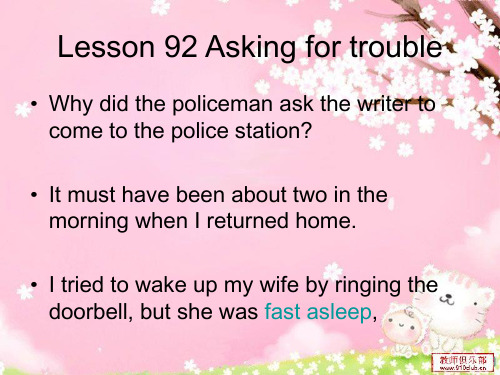
Topics for discussion
• 1 Have you ever said something that you regretted immediately? Why did you regret it?
• 2 What would you do if you had forgotten your house key late at night?
• I was almost there when a sarcastic voice below said,
• ‘I don't think the windows need cleaning at this time of the night.’
• I looked down and nearly fell off the ladder when I saw a policeman.
• ‘Your what?’ he called.
• My ely, the shouting woke up my wife who opened the window
• just as the policeman had started to climb towards me.
• 3 What would you do if you saw someone trying to enter the window of a house late at night? Would you call the police? Why/Why not?
• I tried to wake up my wife by ringing the doorbell, but she was fast asleep,
• so I got a ladder from the shed in the garden,
新概念英语第二册92课

Lesson 92
Asking for trouble 自找麻烦
单词学习
• fast [fɑ:st]
• adv. 熟(睡)
Байду номын сангаас
• ladder ['lædə(r)] • n. 梯子
• shed [ʃed]
• n. 棚子
• sarcastic [sɑ:ˈkæstɪk] • adj. 讽刺的,讥笑的
• tone [təʊn]
• ”我向下面看去。当我看清是一个警察时,差一点儿从梯子 上掉下去。我回答了他的话,但马上又后悔不该那样说,我 是这样说的:“我喜欢在夜里擦窗子。”
• regret doing sth 後悔做過某事 • regret to do sth 遺憾(要)做某事 • I regret being unable to help you.我没能帮助你,深感遗憾。
• n. 语气,腔调
★ fast (1)adv. 熟(睡)地(soundly) • He is fast asleep .他睡得很熟. • = He is sleeping soundly . • = He is sleeping deeply . • (2) 快地(rapidly 迅速地) • He ran to school fast. 他飞快地奔向学校。 • (3)牢固地 • His feet were stuck fast in the mud. • 他稳稳地站在泥地里。
• Asking for trouble 自找麻烦 • ask for 请求,要求,寻求 • make trouble 鬧事, 搗亂,惹麻煩 • 不可以再给你的老师带来麻烦 • You must not make any more trouble for your teacher. • take the trouble to do sth. 费神做……,不辞劳苦地做 • get into trouble 陷入困境, 惹上麻煩 • have trouble with sb 與某人产生纠纷
Asking for trouble 自找麻烦
单词学习
• fast [fɑ:st]
• adv. 熟(睡)
Байду номын сангаас
• ladder ['lædə(r)] • n. 梯子
• shed [ʃed]
• n. 棚子
• sarcastic [sɑ:ˈkæstɪk] • adj. 讽刺的,讥笑的
• tone [təʊn]
• ”我向下面看去。当我看清是一个警察时,差一点儿从梯子 上掉下去。我回答了他的话,但马上又后悔不该那样说,我 是这样说的:“我喜欢在夜里擦窗子。”
• regret doing sth 後悔做過某事 • regret to do sth 遺憾(要)做某事 • I regret being unable to help you.我没能帮助你,深感遗憾。
• n. 语气,腔调
★ fast (1)adv. 熟(睡)地(soundly) • He is fast asleep .他睡得很熟. • = He is sleeping soundly . • = He is sleeping deeply . • (2) 快地(rapidly 迅速地) • He ran to school fast. 他飞快地奔向学校。 • (3)牢固地 • His feet were stuck fast in the mud. • 他稳稳地站在泥地里。
• Asking for trouble 自找麻烦 • ask for 请求,要求,寻求 • make trouble 鬧事, 搗亂,惹麻煩 • 不可以再给你的老师带来麻烦 • You must not make any more trouble for your teacher. • take the trouble to do sth. 费神做……,不辞劳苦地做 • get into trouble 陷入困境, 惹上麻煩 • have trouble with sb 與某人产生纠纷
新概念英语NCE2_Lesson92(共22页)课件

③ n. 格调,风格,气氛
• Her dress has a bright tone.
• The building has a foreign tone.
I don't think... L. 5
language Points
• 有些动词如think,believe,expect,suppose 等 后接表示否定意思的宾语从句时,通常在主句中 使用否定形式,但译成汉语时否定意义仍在宾语 从句中。
• I forgot to ask Tom. 我忘了去问汤姆。
• remember/forget doing sth. 指过去的动作(已发 生过)
(覆水难收) It is fun playing with children.
Grammar
作宾语
Grammar
• 避免、错过、(少)延期 avoid, miss, postpone
• 建议、完成、(多)练习 suggest, finish,practise
• 喜欢、想象、禁不住
like/live,imagine/fancy,
See the difference: It was about two in the morning. It must have been two in the morning.
sleep n. v. & adj.
language Points
was fast asleep ( adj.) sleep soundly ( v.) see L. 27 Wet night go to sleep (n.)
Need doing 表被动
• You hair needs cutting • The flower needs cutting. • You bedroom needs cleaning.
• Her dress has a bright tone.
• The building has a foreign tone.
I don't think... L. 5
language Points
• 有些动词如think,believe,expect,suppose 等 后接表示否定意思的宾语从句时,通常在主句中 使用否定形式,但译成汉语时否定意义仍在宾语 从句中。
• I forgot to ask Tom. 我忘了去问汤姆。
• remember/forget doing sth. 指过去的动作(已发 生过)
(覆水难收) It is fun playing with children.
Grammar
作宾语
Grammar
• 避免、错过、(少)延期 avoid, miss, postpone
• 建议、完成、(多)练习 suggest, finish,practise
• 喜欢、想象、禁不住
like/live,imagine/fancy,
See the difference: It was about two in the morning. It must have been two in the morning.
sleep n. v. & adj.
language Points
was fast asleep ( adj.) sleep soundly ( v.) see L. 27 Wet night go to sleep (n.)
Need doing 表被动
• You hair needs cutting • The flower needs cutting. • You bedroom needs cleaning.
- 1、下载文档前请自行甄别文档内容的完整性,平台不提供额外的编辑、内容补充、找答案等附加服务。
- 2、"仅部分预览"的文档,不可在线预览部分如存在完整性等问题,可反馈申请退款(可完整预览的文档不适用该条件!)。
- 3、如文档侵犯您的权益,请联系客服反馈,我们会尽快为您处理(人工客服工作时间:9:00-18:30)。
• 我看不必在夜里这个时侯擦窗子吧。 • (1)有些动词如 think, believe,expect,
suppose 等后面跟表示否定意思的宾语从 • 句时,否定词not 往往用在主句中,但译成汉语
时否定意义应在宾语从句中。我们一般不说
• I think Mary won't come this evening, • 而说 I don't think Mary will come this evening。
• remember / forget+ 动名词形式则指过去的动 作(已发生过):
• I remember posting / having posted the letters. • 我记得已把信寄了。
• Have you forgotten meeting / having met her at a party?
• 2.I immediately regretted answering in the way I did.
• 我立刻后悔不该那样回答。 • regret 后面接动名词形式与接不定式的含义
不同。接动名词形式表示对做过的事感到 后悔,接不定式则表示对现在将发生的事 感到遗憾或抱歉
• I regretted saying it almost at once. • 我几乎马上就后悔说了这话。
又如:
• I don't believe he is still in London. • 我相信他已不在伦敦。
• (2)need cleaning 的含义相当于 • need to be cleaned。
• need 表示“需要”时,后面接的动名词有 被动的含义
• The strap needs mending. • 这提包带需要修理。
Lesson 92
Asking for trouble 自找麻烦
• 1.ask for trouble • 自找麻烦,自讨苦吃(多用于口语)。
• You shouldn't have been so rude to her. You are asking for trouble.
• 你不该对她那么粗鲁。你这是自找麻烦。
• You should work less and so should I. • 你应该少干一点,我也应如此。
• You shouldn't work so hard and nor should I.
• 你不应该如此用功,我也不应该。(重复 情态助动词should)
• I've got a new car and so has John.
• Remember to post the letters. • 要记着/别忘记去邮信。
• I remembered to post the letters. • 我记着去邮信了。(没有忘记)
• Don't forget to ask Tom. • 别忘记去问汤姆。
• I forgot to ask Tom. • 我忘了去问汤姆。
• 我买了一辆新车,约翰也买了一辆。(重 复助动词 have)
• She's going to help us and so is Jim.
• 她将帮助我们,吉姆也将帮助我们so does Frank.
• 他喜欢啤酒,弗兰克也喜欢。(加助动词 does)
• 2.用于并列补充句和反应句的 so与 neither/nor
• so和 neither/nor 用于并列补充句和表示 反应的句子时表示“也”、“同样”, so 用
• 于肯定句,neither /nor 用于否定句 (neither 和 nor完全可以互换)。它们后 面跟的是省略
• 形式的分句,只有助动词+ 主语,也可以是 情态助动词 +主语:
• 他给我们讲故事时我们不禁都笑个不停。
• 1.tone n. • (1)语气,口气,腔调:
• The policeman answered in a sarcastic tone.
• 警察用讽刺的口吻回答。
• The waiter greeted us in a friendly tone. • 那侍者用友好的口气同我们打招呼。 • (2)语调,声调:
• 你忘记了曾在一次聚会上见过她吗?
• stop+ 不定式指目的:
• On the way to the station I stopped to buy a paper.
• 去车站的路上,我停下来买了一张报纸。 • stop+ 动名词形式表示停下正在做的动作:
• When he told us the story, we just couldn't stop laughing.
• You should use the rising / falling tone at the end of this sentence.
• 在这句话的结尾你应该用升调/降调。
• 3)格调,风格,气氛: • Her dress has a bright tone. • 她的衣服格调明快。 • The building has a foreign tone. • 这座建筑物有一种异国情调。
• The boss seems to be annoyed. To talk to him now is to ask for trouble.
• 老板似乎在生气。现在找他谈话是自讨苦吃。
• 2.I don't think the windows need cleaning at this time of the night.
• We regret to inform you that you needn't come here next week.
• 我们很遗憾地通知你下周不用来这儿了。
• 与 regret 相似, remember,forget,stop 等动 词后面接不定式与接动名词形式的意义有很大不 同。
• remember / forget+不定式指未来的动作(或从 过去观点看的“未来的”举动):
suppose 等后面跟表示否定意思的宾语从 • 句时,否定词not 往往用在主句中,但译成汉语
时否定意义应在宾语从句中。我们一般不说
• I think Mary won't come this evening, • 而说 I don't think Mary will come this evening。
• remember / forget+ 动名词形式则指过去的动 作(已发生过):
• I remember posting / having posted the letters. • 我记得已把信寄了。
• Have you forgotten meeting / having met her at a party?
• 2.I immediately regretted answering in the way I did.
• 我立刻后悔不该那样回答。 • regret 后面接动名词形式与接不定式的含义
不同。接动名词形式表示对做过的事感到 后悔,接不定式则表示对现在将发生的事 感到遗憾或抱歉
• I regretted saying it almost at once. • 我几乎马上就后悔说了这话。
又如:
• I don't believe he is still in London. • 我相信他已不在伦敦。
• (2)need cleaning 的含义相当于 • need to be cleaned。
• need 表示“需要”时,后面接的动名词有 被动的含义
• The strap needs mending. • 这提包带需要修理。
Lesson 92
Asking for trouble 自找麻烦
• 1.ask for trouble • 自找麻烦,自讨苦吃(多用于口语)。
• You shouldn't have been so rude to her. You are asking for trouble.
• 你不该对她那么粗鲁。你这是自找麻烦。
• You should work less and so should I. • 你应该少干一点,我也应如此。
• You shouldn't work so hard and nor should I.
• 你不应该如此用功,我也不应该。(重复 情态助动词should)
• I've got a new car and so has John.
• Remember to post the letters. • 要记着/别忘记去邮信。
• I remembered to post the letters. • 我记着去邮信了。(没有忘记)
• Don't forget to ask Tom. • 别忘记去问汤姆。
• I forgot to ask Tom. • 我忘了去问汤姆。
• 我买了一辆新车,约翰也买了一辆。(重 复助动词 have)
• She's going to help us and so is Jim.
• 她将帮助我们,吉姆也将帮助我们so does Frank.
• 他喜欢啤酒,弗兰克也喜欢。(加助动词 does)
• 2.用于并列补充句和反应句的 so与 neither/nor
• so和 neither/nor 用于并列补充句和表示 反应的句子时表示“也”、“同样”, so 用
• 于肯定句,neither /nor 用于否定句 (neither 和 nor完全可以互换)。它们后 面跟的是省略
• 形式的分句,只有助动词+ 主语,也可以是 情态助动词 +主语:
• 他给我们讲故事时我们不禁都笑个不停。
• 1.tone n. • (1)语气,口气,腔调:
• The policeman answered in a sarcastic tone.
• 警察用讽刺的口吻回答。
• The waiter greeted us in a friendly tone. • 那侍者用友好的口气同我们打招呼。 • (2)语调,声调:
• 你忘记了曾在一次聚会上见过她吗?
• stop+ 不定式指目的:
• On the way to the station I stopped to buy a paper.
• 去车站的路上,我停下来买了一张报纸。 • stop+ 动名词形式表示停下正在做的动作:
• When he told us the story, we just couldn't stop laughing.
• You should use the rising / falling tone at the end of this sentence.
• 在这句话的结尾你应该用升调/降调。
• 3)格调,风格,气氛: • Her dress has a bright tone. • 她的衣服格调明快。 • The building has a foreign tone. • 这座建筑物有一种异国情调。
• The boss seems to be annoyed. To talk to him now is to ask for trouble.
• 老板似乎在生气。现在找他谈话是自讨苦吃。
• 2.I don't think the windows need cleaning at this time of the night.
• We regret to inform you that you needn't come here next week.
• 我们很遗憾地通知你下周不用来这儿了。
• 与 regret 相似, remember,forget,stop 等动 词后面接不定式与接动名词形式的意义有很大不 同。
• remember / forget+不定式指未来的动作(或从 过去观点看的“未来的”举动):
